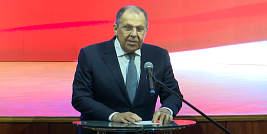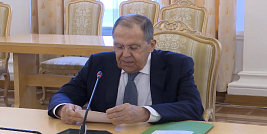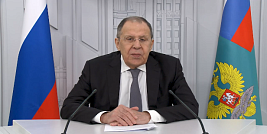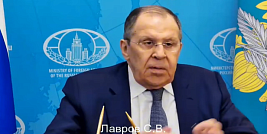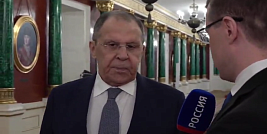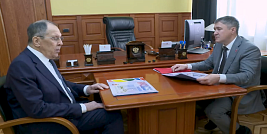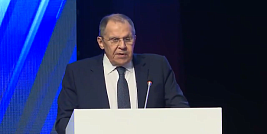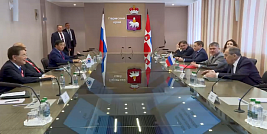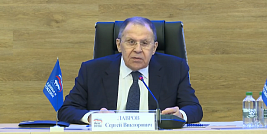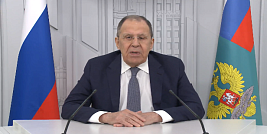Speech by Russian Foreign Minister Sergey Lavrov at World Thematic Conference of Compatriots on Status of Russian Language in Foreign Countries, Moscow, October 17, 2011
Esteemed Colleagues and Friends,
Allow me to declare the World Thematic Conference of Compatriots open.
First of all I would like to read out the greeting message of President of the Russian Federation Dmitry Medvedev to our forum.
Dear Friends,
The message of the President of Russia to our Conference is evidence of the considerable attention which the country's leadership gives the subject. We are well aware that it has a special, priority significance for the Russian community abroad. The federal executive and legislative bodies, Russia's regions, the media, and academic, cultural, and business circles of our country are focused on working actively to preserve and strengthen the position of the Russian language abroad.
In the four years since the last Conference the Federal Agency for Commonwealth of Independent States, Compatriots Living Abroad and International Humanitarian Cooperation (a self-revealing name) has been established and Russkiy Mir, a special purpose foundation, has begun to function.
The admission quotas for foreign citizens and compatriots in Russian publicly financed educational institutions have been increased significantly – by up to 10,000 people. A new targeted federal program, Russian Language, for the years 2011-2015 has kicked off. Specific measures under this program envision providing much more support for the preservation and dissemination of Russian abroad than ever before. A concept of the Russian School Abroad program is being developed to improve the quality of educational services. It is aimed at the formation and maintenance of standard models of educational institutions outside of Russia which will carry on their activities with reference to the Russian educational standards. We hope that this step will help enhance the attractiveness of higher professional education in Russian tertiary educational institutions for young people.
A Decree of the President of the Russian Federation designated June 6 a Russian Language Day. This year the date was marked by extensive cultural and humanitarian events and activities in this country and abroad.
There has been a much wider effort to help preserve the ethno-cultural identity of compatriots on the part of Russia's regions – more than 30 members of the Russian Federation are now involved in this work, and the process continues to gain momentum.
Strengthening the position of the Russian language has been a major focus of attention in the programs of work with the Russian community that are being implemented under the auspices of the Government Commission for the Affairs of Compatriots Abroad.
This year marks the completion of the Program of Work with Compatriots Abroad 2009-2011. In the course of its implementation a whole array of events have been held, which I hope will be remembered for a long time. Among them – the major international festivals "The Great Russian Word" in the Crimea, "With Russia in the Heart" in Kazakhstan, "Slavic heritage" in Belarus, "Mother Russia" in Argentina, the International Forum of Ukrainian Russianists. Memorable dates in Russian history and culture were marked in dozens of countries. Each year about 1,200 young compatriots made introductory study trips to historical places of our country under the Hello Russia program. Russian and local Russian-language periodicals were circulated among compatriots. Projects being realized include "The School Student's Library," "The Library of a Compatriot," and "The Library of Spiritual and Moral Literature." Efforts of compatriots' organizations helped to put out books about the past and present of the Russian communities abroad in 56 countries. Four regional magazines for compatriots: "Shire Krug (Widen the Circle)," "The Baltic World," "Unity in Diversity," and "Russians in America" are being published. Work has begun on the creation and maintenance of Russian-language information resources for your organizations. In general, admittedly, a lot has been done, but the effort must not only continue but increase.
In the near future, the Russian government plans to approve a new Program of Work with Compatriots, which is designed for 2012-2014. It reflects all the best achievements of the current Program, as well as new ideas and initiatives to facilitate the preservation of the ethnic and cultural identity of compatriots and strengthening the position of the Russian language.
I take this opportunity to thank the participants of our Conference, and through you all activists of the voluntary organizations of compatriots who put their hearts, their time and energy into the development of the Russian-speaking space abroad and into the popularization of Russian cultural and humanitarian traditions in foreign countries.
I hope that in the upcoming discussions here, you will closely look at the whole range of issues concerning the status of Russian language in your country of residence, and identify the most effective ways to address them, including invoking the provisions of relevant international conventions and local legislation.
For our part we will continue to provide you with comprehensive assistance, including political, legal, and organizational help. By Presidential Decree, a Fund to support and protect the rights of compatriots has been set up that will become fully operational in two months, from early 2012. One of the basic directions of its activity will be to protect the rights of compatriots to their native language.
Dear Friends,
Our country is entering a crucial period of constitutional renovation of the supreme body of legislative power – the State Duma of the Federal Assembly of the Russian Federation. Today's challenges of creating a more modern, dynamic and strong Russia make it necessary for all Russians to be actively involved in tackling them. Therefore, in the upcoming election each vote is very important.
We invite all Russian citizens who will, on voting day, be abroad to come to one of the 350 polling stations organized in 146 countries worldwide by Russian diplomatic and consular missions and to cast their votes.
I wish you fruitful deliberations and thank you for your attention.
